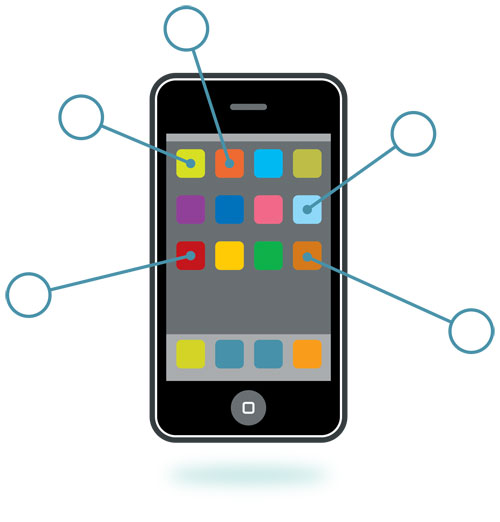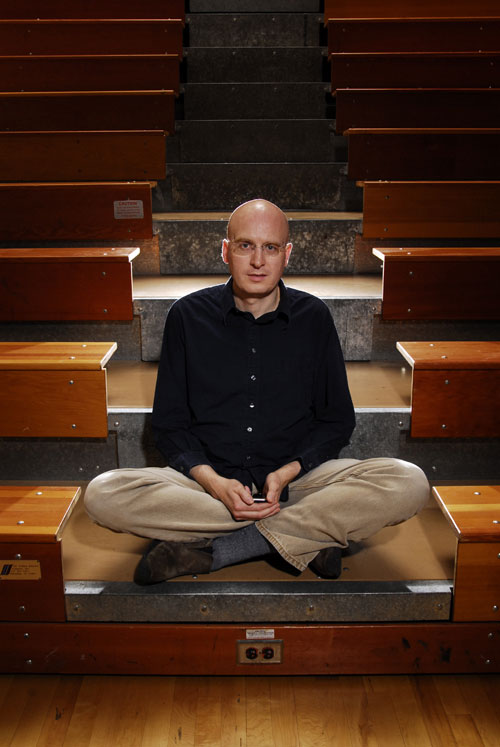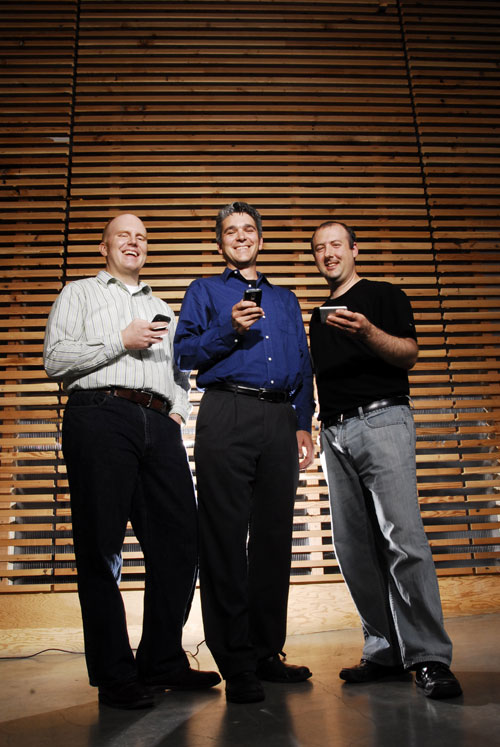 Hordes of ambitious software developers are making Portland the place for killer app development.
Hordes of ambitious software developers are making Portland the place for killer app development.
Hordes of ambitious software developers are making Portland the place for killer app development.
STORY BY ADRIANNE JEFFRIES// PHOTOS BY ANTHONY PIDGEON
 |
NAME: Raven Zachary |
Raven Zachary fell hopelessly in love with the Apple iPhone and dropped his job as a tech analyst last year to develop applications, or “apps,” for it. He had completed only one app when a friend at Barack Obama’s presidential campaign called last August to ask him to assemble a crack team of iPhone developers who could keep a secret.
Organizing people is innate to Zachary, a techie social butterfly behind many Portland tech events. He’s best known for creating iPhoneDevCamp, a national conference in its third year that includes an app contest called the Hackathon.
After hanging up with the campaign, Zachary called Jason Grigsby for an urgent lunch meeting.
Grigsby is a deft public speaker and a dynamic phone conversationalist whose social skills often fail him when eye contact is introduced. If Zachary is a butterfly, Grigsby could be a bee — less flashy, but equally social, and well connected to the hive. He organizes Mobile Portland, a monthly meeting of developers that has about 300 members and a logo of roses holding cell phones.
As a prominent mobile developer and the field director for Deschutes County District Attorney Mike Dugan’s unsuccessful 1996 congressional campaign, Grigsby had the perfect skill set. He also already had plans with his wife. “Raven sort of barged in on our lunch,” Grigsby says. But as an ardent Obama supporter, “It was worth the interruption.”
The Obama campaign wanted an iPhone app to help get out the vote, Zachary told the Grigsbys. The Apple App Store was less than two months old and new apps pushing the boundaries of niftiness debuted every day. It was 75 days before Election Day. The time pressure was immense and the campaign was worried about a leak.
Grigsby and Zachary met again at 10 p.m. a few days later and stayed up until 3 a.m. brainstorming. They decided Obama’s policies should be viewable on the phone in case supporters found themselves in spontaneous debate. They planned a feature to sort contacts so users could call their friends in swing states and designate them as “not interested,” “considering Obama,” or “already voted.” The app would also find local events and show videos, photos and news updates.
Grigsby and Zachary submitted their ideas to Obama’s tech council. They got the other three members of Grigsby’s company, Cloud Four, up to speed and recruited four developers in the Bay Area and one in South Carolina.
Then from the campaign, radio silence. The Democratic National Convention had consumed Obama’s staffers. Grigsby and Zachary waited until September, when the campaign made contact again. It’s a go, they said. Let’s have it done in three weeks.
Development took place over the next 22 days, a frenzied timeline Zachary succinctly describes as “not recommended.” The developers worked independently and coordinated via midnight phone conferences. The app was tested by 80 volunteers, none of whom peeped to the media, and unveiled in October. It generated 150 news stories, most of them glowing, and was downloaded more than half a million times.
The Obama app was pro-bono but it made a shiny resume item for Zachary and Grigsby, who were among scores of Portland developers caught up in the gold rush that followed the success of the first blockbuster apps. The intrinsic allure of the iPhone was enhanced by stories of developers who earned hundreds of thousands on downloads and quit their day jobs. “People became pretty consumed with trying to get their apps in the App Store and make money,” Grigsby says. “Not a day went by that I didn’t have somebody talking to me about their ideas for an iPhone app — Shabbat dinner, the people that I play basketball with.”
Zachary planned to work as a consultant, but his clients wanted their guru to design and build their apps as well. In February he launched Small Society, which now has seven employees and has developed apps for Clif Bar, Zipcar, and Whole Foods. Grigsby wrestled with the idea of doing iPhone development exclusively, but decided to keep developing for different handsets.
 |
NAME: Jason Grigsby (left) |
Third-party applications for phones were rare before the iPhone’s touch screen, orientation sensor, GPS and other features tempted hackers to write programs that could be illegally installed. Apple legitimized third-party apps when it released a software developer kit in March 2008 and popularized them by launching the App Store in July 2008. App stores by BlackBerry, Nokia and Google quickly followed but Apple’s is the biggest. The App Store had about 7,000 apps for sale when the Obama app debuted; now there are more than 50,000.
Most apps in the store are $2.99, less or free, but profits from popular paid apps can be substantial for developers who write their own apps for the cost of their time. The less risky model is to write branded apps for companies seeking exposure. Zachary says it’s common for companies to spend $30,000 and up on iPhone app development. (All app developers interviewed for this story declined to give revenue figures.)
Portland’s small, bootstrapped startups are well suited to mobile development, where flexibility is more important than venture capital. App stores subsidize developers by taking care of publishing and distribution for usually a 30% cut. And just as the presence of Linux founder Linus Torvalds has fed Portland’s vibrant open-source community, the reputation of trailblazers like Zachary, Grigsby and others is a big boon to the mobile scene.
Spotlight Mobile is another big Portland name. Kiyo Kubo is 30 and his partner Nick Farina is 29, but they’re dinosaurs as far as mobile development goes. Kubo and Farina met while researching “ubiquitous computing” at Cornell, which in the late ’90s became one of the first campuses to go wireless. “Everywhere, across the entire campus, you could get on the Internet without wires,” Kubo says. “We thought, what can we do with this?”
In 1998, the pair wrote an application for laptops to deliver information based on the user’s location. “People didn’t get it at all,” Kubo says. “This was way over their heads.”
Kubo and Farina continued to develop for mobile devices and moved to Portland in 2002 to found Spotlight Mobile. They specialized in mobile-guided museum tours, where they typically coded for devices that the museum loaned to visitors. Coding for phones was trickier because of the variety of interfaces and screen resolutions, plus the challenge of how to deliver the app to the phone. Then the iPhone came along with its crisp display, powerful processor and easy app delivery through the App Store. Clients started clamoring for iPhone apps.
Spotlight Mobile’s first iPhone app, Style.com, was commissioned by Condé Nast for Vogue; Kubo wouldn’t disclose the price. Style.com lets users see images from runway shows in real time and browse through looks from previous years. It debuted in the App Store just in time for Fashion Week in August 2008. When the rep from Condé Nast called Kubo, she mentioned that Portland was disproportionately represented on her short list. “She said, ‘It’s funny because it’s three or four companies in Portland that I’m calling to talk to about this stuff,’” Kubo says. “There’s something in the water, there’s definitely a mobile thing going up in Portland.”
MADE IN PORTLAND
ZIPCAR FOR IPHONE |
Local developers hope that Portland will soon become a mobile hub despite strong competition from Seattle and the Bay area.
“What Portland does in the next six months is going to dramatically impact whether we’re known in the next decade as one of the top mobile cities,” says Zachary, Portland’s unofficial mobile ambassador. Zachary makes introductions constantly, travels to speak at conferences, and gave an interview to The New York Times for an April story on iPhone apps.
“I certainly promote Portland but it’s not a coordinated effort,” Zachary says. “With Silicon Valley, there was no organization, it just kind of happened. So I think perhaps the same thing will happen here. People tend to be freelancers with a variety of different backgrounds and disciplines, used to adopting new platforms. We were early to the party and I think that’s going to bode very well.”
Zachary estimates that Portland is responsible for between 75 and 100 apps in the App Store, or less than 1%. But as Kubo says, “There are 50,000 apps and 49,490 of them are crap.” Out of a small number of apps, Portland has had a lot of hits. Subatomic Studios, founded by two former video game developers, came out with one of Apple’s 20 All-Time Top Paid Apps: a game called Fieldrunners where the objective is to build mazes out of gun towers to slaughter a stampede of enemies before they reach the end of the screen. Fieldrunners was No. 9 on Time’s list of the year’s top 10 games — that’s not just iPhone games, but all video games — and had a 5/5 star rating in the App Store after 5,000 user reviews.
The mobile app boom generated a sub-industry of developer support services, and Portland is making waves in this area, too.
Urban Airship, co-founded by Scott Kveton, former interim president of the Software Association of Oregon, is a set of tools that helps developers coax more money out of customers. It’s almost impossible to maintain a revenue stream from individual apps even when developers score big with a hit like Fieldrunners; one $2.99 purchase, and the customer is gone. Urban Airship lets developers prompt users when updates come out, directing them seamlessly to the App Store to buy.
Another promising startup providing app-related services is Mobspot, launching this month, which aims to help users sort through the noise in the growing app stores. The “new” and “what’s hot” sections of the App Store cause consumer tunnel vision, and the constant influx of new apps makes it tough to stay on those lists. Part app store, part social network, Mobspot will guide users to new apps they might like. Mobspot has two major assets: Apple’s cooperation, and founder Ben Jacobsen, who comes from a director position at Opera, which makes the most popular mobile web browser, Opera Mini.
BY THE NUMBERS
36,404,400 |
But Seattle, New York and San Francisco are all cities with thriving mobile communities threatening to eclipse Portland’s app success.
Some developers worry that the fast-growing mobile industry could morph into a traditional mass-market model that favors bigger companies or access to venture capital.
All startups eventually need investment “in order to grow past the stage of being a few guys,” says Marc Prud’hommeaux, founder of Portland-based Lexcycle, which was bought by Amazon and transplanted to Seattle last month.
Prud’hommeaux wanted to make a mobile e-reader years before Amazon came out with the Kindle. He was a big reader, but not a fast one, lugging the same books around on business trips for weeks. “For a number of years I’d been thinking about electronic reading,” Prud’hommeaux says. “I just thought it was a hassle to carry around books all the time. I always carry around a laptop and a phone. It would be great if they were merged into one.”
Then he picked up an iPhone in 2007 and decided it was perfect for buying and reading e-books. He and two colleagues in Texas got to work building Stanza, an e-reader app, as soon as Apple released the developer kit. Stanza hit the e-shelves on July 13, 2008. In November, Stanza hit 500,000 downloads. The free e-reader was featured in The New York Times, Time and Forbes. It now has more than 2 million users.
Lexcycle gets a cut from the publishers of the 100,000 free and paid titles in Stanza’s catalog. The company took no outside money before the Amazon acquisition, which they announced in an excited blog post in April.
If the advantage shifts away from small developers, Portland could lose to cities with larger software companies, more venture capital or the presence of a major mobile company.
“I believe that with a well-spoken evangelist like Raven Zachary, Portland has the opportunity to be an important player with mobile,” Lexcycle CEO Neelan Choksi wrote in an email from the Future of the Book conference in New Zealand, where he was scheduled to speak. “The challenge that faces Portland is that there are no carriers and no device manufacturers in Portland. I think you are going to see strongholds for mobile in the Bay Area near Apple, in Seattle near Microsoft, in New Jersey near Verizon Wireless.”
But FreeRange Communications will stay in Portland even though it was acquired in February by Handmark, a mobile giant based in Kansas, where Sprint is headquartered.
FreeRange was a three-man operation founded on the couches at the Alto Lounge bar on Belmont in 2004, evidence that mobile development in Portland predated the iPhone hype. FreeRange lets clients like the Wall Street Journal and the Portland Trailblazers stream real-time information to users through apps on their phones.
Amazon’s demand that Lexcycle move to Seattle seems unnecessary since app development is often decentralized. (Choksi and Prud’hommeaux never talked face-to-face during Stanza’s development; now they will be in the same office in Seattle. “Hopefully we’ll get along as well as we do on instant messenger and the phone,” Prud’hommeaux says.) Handmark was happy to keep FreeRange in Portland, where it has 12 employees. “One of the things that Handmark was most interested in was the talent pool here,” FreeRange co-founder Jon Maroney says.
On a recent Wednesday evening, about 30 men gather at Jive Software in downtown Portland to see six presentations of new web- sites and applications from local developers. The first demo is Mobspot, the mobile app marketplace that’s still in development, and Jason Grigsby is in the front row. The sound of soft typing underscores the conversations as the elevator dumps another load of guys in nerdy T-shirts.
Grigsby is here because he’s a mobile wonk. He asks the first question, which is a softball, and then grills the Mobspot presenter on a technical point. The iPhone gets most of the attention in the mobile community, but Grigsby is platform agnostic. He and Cloud Four collaborated with FreeRange on its handset-generalist news reader. He can tell you who is working on apps for Google’s obscure open source phone, the Android. He often references what’s happening in Europe and Asia.
Zachary and Grigsby are “two nice bookends to the mobile space,” says Rick Turoczy, who writes about the Portland tech scene on his blog, Silicon Florist. But he calls Grigsby when he needs a source on mobile. “More and more people are beginning to appreciate how much insight Grigsby really has into the mobile scene. He’s been chanting this stuff for as long as I’ve known him,” Turoczy says.
Grigsby was initially skeptical as local developers touted the singularity of Portland as a mobile haven. “I was unwilling to participate in the idea that there might be something unique about Portland and its mobile developer community versus others,” he says. He changed his mind recently, impressed by the slew of killer apps.
But the movement is evolving so rapidly that even a mobile leader and Portland advocate like Grigsby is just along for the ride. “People replace their handsets every 18 months,” he says. “Thinking about what’s going to happen five years from now is really crazy.”


